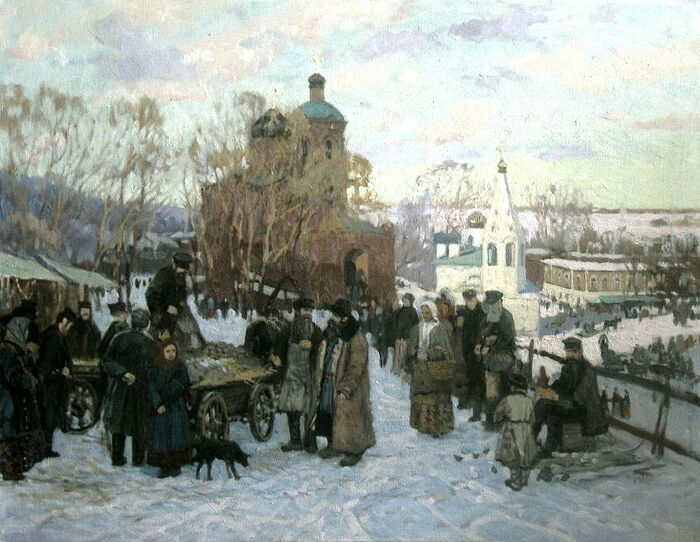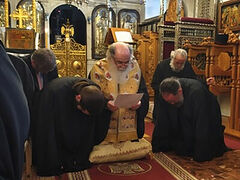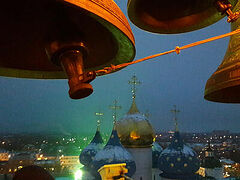 Forgiveness Sunday. Artist: Kopnyak Valery. Photo: triptonkosti.ru
Forgiveness Sunday. Artist: Kopnyak Valery. Photo: triptonkosti.ru
Today the Holy Church reminds us in its hymns of the casting out of Adam from paradise, of man’s loss of blessedness and joy. The Holy Church warns us of the terrible power of sin, and calls us who stand before the doors opening to the Holy Forty Days, to force ourselves and tear ourselves away from the maelstrom of everyday vanity.
We often lull ourselves with the thought that the Lord is greatly merciful, that just as He forgave the Prodigal Son, accepted the Publican, and forgave the good thief on the cross, He will also have mercy on us. However, my dear ones, we forget that all of those men had not only strong faith, but also profound repentance and total conversion to Christ. Tell me, do we each have this?
The weeks of Great Lent are a time of abstinence from everything that binds a person to earth, and lowers his dignity; these are days of increased spiritual life. And each of us, in the days of Great Lent, should look more deeply into ourselves, think about how we live, what seeds we sow with our thoughts and the example of our lives in our family circles and in those around us. We should prepare ourselves for a meeting with the Lord. We are given the days of Great Lent to help us in this work on ourselves.
Entering the gates of the Holy Forty Days, we hear from the lips of Apostle Paul, What? know ye not that your body is the temple of the Holy Ghost? (1 Cor. 16:9-20). There is a brief parable about a man who loved precious aromatic myrrh. Well, one day he decided to throw a vessel of fragrant myrrh into the stinking trash. This ruined the expensive myrrh. What will you say, dear brothers and sisters, about this man? Each of us will say of him, “He is pitiful, stupid, abnormal… But this brief parable applies to us, because we do the same thing as this pitiful man. After all, along with our good deeds and virtues we mix in unfriendliness, resentfulness, anger, irritation, and ambition—and by this we spoil our good deeds, our best instincts. We kill them this way.
“We brightly begin the time of the fast”, Christ’s Church calls out to our awareness. And in the Gospels we heard today, the Lord shows us what is needed for us to brightly pass through the time of Great Lent. Forgiveness is a mandatory condition for new life in Christ. It is the first step of spiritual work on ourselves. For if ye forgive men their trespasses, your heavenly Father will also forgive you, says the Lord. Forgive thy neighbour if he hath hurt thee: and then shall thy sins be forgiven to thee when thou prayest (Sir. 28:25).
Are you ready, dear ones, to enter into the time of Great Lent, to forgive your neighbors, for any offense they’ve caused you? But thou, when thou fastest, anoint thine head, and wash thy face. What does this mean? According to the explanation of the holy fathers, the head of the body is the mind, and the face is the thoughts and feelings. If you want your fast to be pleasing to God and successful, make your mind merciful, and wash your thoughts and feelings of all that is impure and base, the Lord tells us. Everything here is simple and understandable.
Thus, dear brothers and sisters, let us make an effort for the good and bright in our own selves. Do not forget that each of our efforts towards goodness is our participation in the common struggle with evil, in the common struggle for Christ in this world. Amen.



